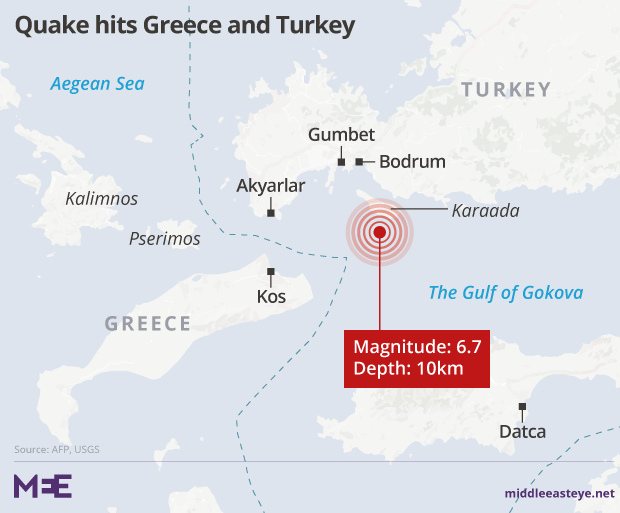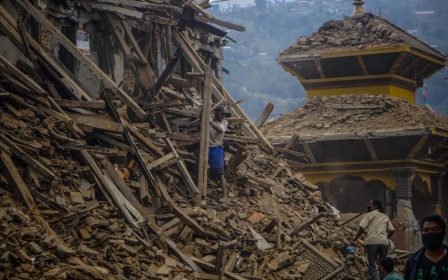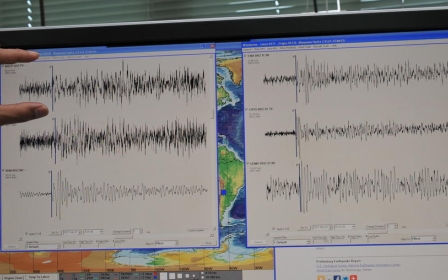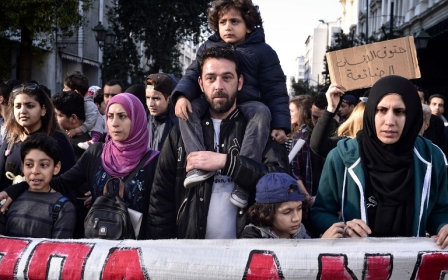Two dead as Turkish and Greek resorts hit by 6.7 quake
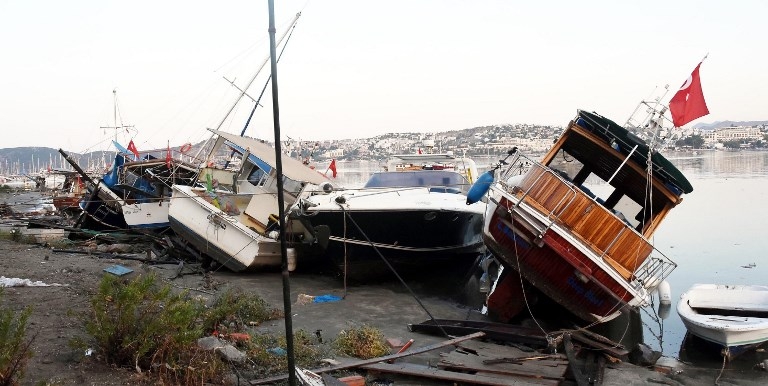
A powerful earthquake of magnitude 6.7 killed two people when it struck near major Turkish and Greek tourist destinations in the Aegean Sea early on Friday, Turkish and Greek officials said.
Local officials said at least two people died and 20 were injured on the Greek holiday island of Kos, a popular destination particularly with British holidaymakers.
Across a narrow Aegean Sea waterway in Turkey's Bodrum, about 70 people were admitted to hospital, injured in their attempts to flee the overnight quake.
The tremor is the second in the broader region exceeding a magnitude of 6 this year, a level which can cause considerable damage.
"We have two dead and some people injured so far," Kos Mayor George Kyritsis told Reuters.
The island's main hospital said 20 people were injured, though other sources put the number higher at at least 30, including two tourists.
The epicentre of the quake was about 10km south of the major Turkish resort of Bodrum, a magnet for holidaymakers in the summer, and 16km east of the island of Kos in Greece, the US Geological Survey said.
It had a depth of 10km, which is shallow for an earthquake, USGS said.
The two people killed on Kos, a hospital official on the island told AFP, died when the ceiling of a building collapsed.
Emergency services said the affected area was a bar in the centre of Kos town. There was no immediate information on the identity of the dead.
In the Turkish resort of Bodrum, television pictures showed throngs of worried residents and holidaymakers in the streets.
"The biggest problem at the moment are electricity cuts in certain areas," Bodrum mayor Mehmet Kocadon told NTV television.
Reports said the state hospital in Bodrum was evacuated after cracks appeared, with incoming patients being examined in a garden outside.
The governor of the southern Mugla province - where Bodrum is located - said some people had been slightly injured after falling out of windows in panic.
The Adliye mosque in central Bodrum suffered some damage, with police cordoning it off to prevent people being wounded by fallen debris, the state-run Anadolu news agency said.
The quake was also felt on the Datca peninsula - also a major resort area - as well as Turkey's third city of Izmir on the Aegean to the north.
Turkish television said the earthquake triggered high waves off Gumbet near Bodrum that flooded the road and left parked cars stranded. There were no reports of casualties.
An AFP correspondent holidaying in Bodrum said the quake was followed by aftershocks.
"The bed shook a lot. Some bottles fell and broke in the kitchen and the patio," said Turkish pensioner Dilber Arikan, who has a summer house in the area.
Turkey and Greece sit on significant fault lines and have regularly been hit by earthquakes in recent years
"I screamed, I was very scared because I was alone."
Erdinc Kalece, 47, and his son Baris, 23, were seeing out the night in the open air in the Turgutreis district outside Bodrum.
"My father and mother were sleeping, I was driving. It was very bad. The road was trembling and I heard a big tremor. I slowed down, waited. I was not scared but anxious," said Baris.
Erdinc added: "Now we're waiting for the aftershock quakes to end."
Turkey and Greece sit on significant fault lines and have regularly been hit by earthquakes in recent years.
This year alone, Turkey's western Aegean coast was hit by several significant earthquakes, which brought back memories of past deadly earthquakes.
In June, a 6.3-magnitude earthquake gutted a village on the Greek island of Lesbos, killing a woman and leaving more than 15 injured. The quake also caused panic on Turkey's Aegean coast.
On 17 August 1999, a huge earthquake measuring more than 7 magnitude near the city of Izmit devastated vast areas in the country's densely populated northwestern zone, notably around Istanbul, killing more than 17,000 people.
New MEE newsletter: Jerusalem Dispatch
Sign up to get the latest insights and analysis on Israel-Palestine, alongside Turkey Unpacked and other MEE newsletters
Middle East Eye delivers independent and unrivalled coverage and analysis of the Middle East, North Africa and beyond. To learn more about republishing this content and the associated fees, please fill out this form. More about MEE can be found here.


